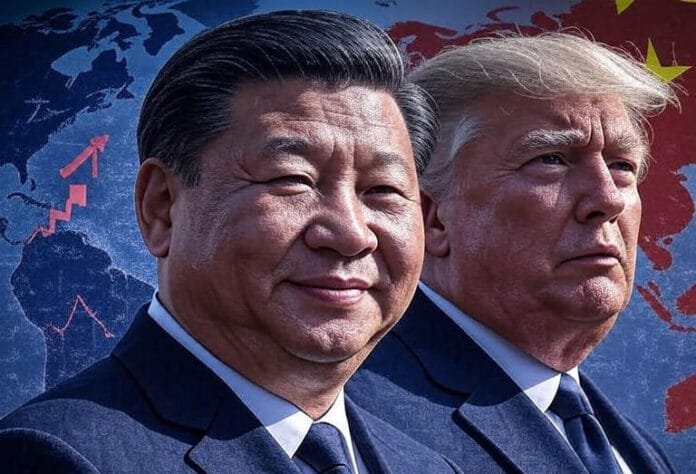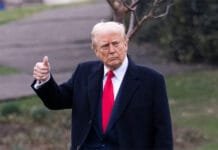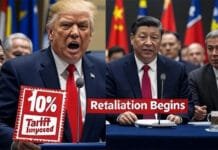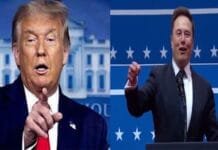A dramatic global perception shift is unfolding, as revealed in a comprehensive Pew Research Center survey conducted across 25 countries. According to this pivotal study, China’s international image under President Xi Jinping is improving, while America’s global standing under Donald Trump is deteriorating sharply. This shift signals a profound transformation in the world’s geopolitical trust dynamics and poses urgent questions about the future of U.S. leadership on the global stage.
Diminishing Trust in the U.S. Under Trump’s Return
The Pew survey, conducted between January 8 and April 26, 2025, and involving more than 30,000 participants, clearly indicates that global trust in the United States has declined notably, especially among high-income countries. Just 35% of respondents across ten leading economies—including Canada, France, Germany, and Italy—held a positive view of the U.S., a significant drop from 51% in 2024.
This erosion in confidence appears to be directly linked to Donald Trump’s return to power, as the report highlights a steady fall in America’s appeal since the 2020s. Many U.S. allies are now rethinking their strategic reliance on Washington, particularly in light of controversial foreign policies, tariff wars, and strained diplomatic relations during Trump’s previous term and resurgence.
China’s Steady Image Recovery Under Xi Jinping
Conversely, China’s image under Xi Jinping is experiencing a measured upswing. The survey notes that 32% of people in high-income nations now express a positive view of China, up from 23% in the previous year. Notably, China has made significant diplomatic inroads in Latin America, Africa, and Southeast Asia, with multiple nations now viewing Beijing as a more stable and reliable partner than Washington.
Although criticism over China’s human rights record, zero-COVID policies, and handling of the Uyghur crisis remains vocal in many quarters, the narrative is clearly shifting. China’s global infrastructure investments, consistent diplomatic engagements, and economic interdependencies have helped rebuild trust, particularly in the Global South.
Mixed Responses Across Key Global Regions
Middle East and Asia Lean Towards Beijing
In several Asian and Middle Eastern countries, views toward China have turned more favorable. Strategic initiatives like the Belt and Road Initiative, coupled with non-interventionist policies, have garnered appreciation. China’s neutral stance on various international conflicts, including those in Ukraine and Gaza, contrasts sharply with America’s military-led foreign policies, which have sparked resentment among both populations and governments.
Europe’s Growing Skepticism Toward the U.S.
European confidence in U.S. leadership has plunged, with major EU powers expressing concern over Trump’s return to protectionist rhetoric and unpredictable governance style. The Pew data reflects a gradual preference for multipolarity, where countries diversify diplomatic and trade relations rather than depending solely on the U.S.
Africa and Latin America Show Split Preferences
In Africa, China’s long-standing investment in infrastructure, healthcare, and energy sectors continues to yield positive sentiment. Meanwhile, Latin American nations remain cautiously optimistic about China, with Brazil and Argentina showing warming ties, while still maintaining cultural and democratic affiliations with the U.S.
Key Countries Where Sentiment Is Shifting
Canada: Positive views of the U.S. fell by 18 points; concerns include immigration policies and environmental rollbacks.
France & Germany: Trust in the U.S. is at historic lows; China is gaining favor due to trade partnerships and climate diplomacy.
Israel: Exceptionally pro-American, with 83% still favoring the U.S., though 33% also hold favorable views of China—indicating a potential dual alignment.
India: Mixed sentiment persists; China is viewed cautiously, but Trump’s anti-immigrant rhetoric has weakened pro-U.S. leanings.
Democratic Senators Warn Against Trump’s Global Damage
Inside the U.S., Democratic lawmakers are sounding alarms about the Trump administration’s foreign policy trajectory. They criticize the rollback of foreign aid programs, tariff impositions on allies, and academic visa restrictions, all of which are undermining America’s influence globally.
The Pew report corroborates these concerns, emphasizing that America’s once unassailable position as a moral and democratic leader is being questioned not only abroad but also domestically by policymakers.
The Decline of the Soft Power Edge
Under President Biden, the U.S. had restored much of its global image through diplomacy, climate action, and multilateralism. However, the re-emergence of Trump-era populism, coupled with isolationist stances, is damaging the soft power edge that America has long leveraged through education, culture, and democratic values.
The survey shows a rising sentiment that America is no longer a consistent ally, a concern particularly prevalent in Western Europe and East Asia, where security alliances like NATO and QUAD depend heavily on U.S. leadership.
What This Means for the Future of Global Leadership
The Pew findings paint a cautionary picture for the future. The gap between China’s and America’s global favorability is narrowing, and if current trends continue, Beijing could soon match or surpass Washington in global influence metrics.
Key implications include:
Reduced U.S. leverage in multilateral forums such as the UN, WTO, and WHO.
Shifting trade and defense alliances away from Washington-centric models.
More countries opting for Chinese infrastructure loans over Western conditional aid.
A possible decline in the U.S. dollar’s soft power in the global financial system.
Trump’s Popularity Still High in Select Nations
Interestingly, in countries like Israel, Hungary, and the Philippines, Trump enjoys high approval ratings. In Israel, 69% of respondents view Trump positively, while only 9% favor Xi Jinping, showing that ideological alignments still play a role in shaping foreign perceptions.
Survey Methodology and Reliability
The Pew Research Center’s methodology remains robust. The survey was conducted across 25 countries, with a margin of error between ±2.5% to ±4.7%. The results reflect real and recent trends in public sentiment and offer an evidence-based snapshot of current global alliances and attitudes.
A Critical Turning Point in Global Perception
The 2025 Pew Research survey sends a strong message: America’s global image is in trouble under Trump, while China, despite its controversies, is regaining strategic favor worldwide. As nations reassess their global alliances, we are entering a phase of recalibrated power equations, where diplomatic consistency, economic cooperation, and trust will determine global leadership—not just military might or historical prestige.
The world is watching. And it’s shifting.















